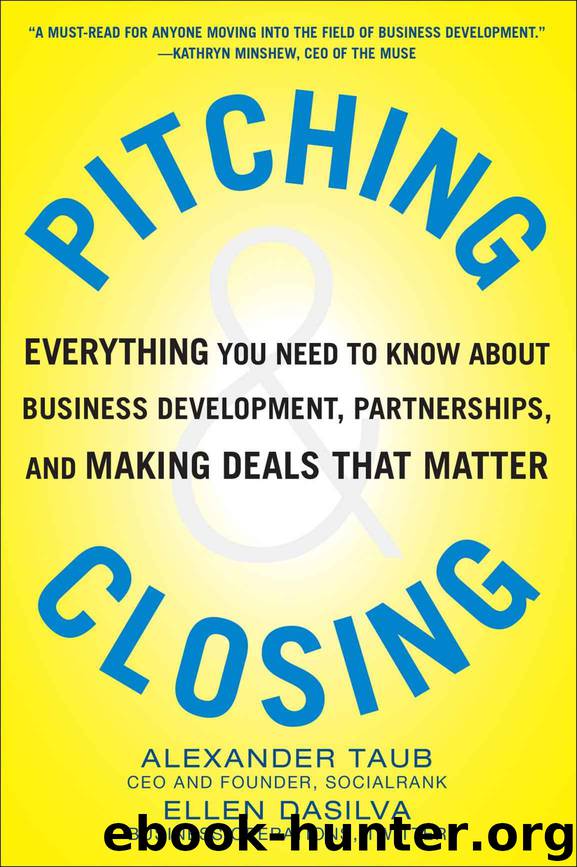Pitching and Closing: Everything You Need to Know About Business Development, Partnerships, and Making Deals that Matter by Alexander Taub & Ellen DaSilva

Author:Alexander Taub & Ellen DaSilva
Language: eng
Format: mobi
Publisher: McGraw-Hill Education
Published: 2014-07-20T16:00:00+00:00
Revenue Sharing
In the early days of partnerships and in a handful of classic situations today, there were barriers to entry when it came to partnering with some big brand names. These brands would require a type of deal that would eliminate some of the smaller, more innovative companies from pursuing partnerships with them. The agreements would involve some kind of up-front payment for working with the partner with the big brand name, with the idea being that the smaller entity could earn back what it had paid once it had the brand name. It used to be the case that big companies could partner only with other large companies because they were the only ones who could afford to do so.
While this still happens as in certain partnerships with the NFL and other sports leagues, there are industries in which smaller companies can partner with larger entities without facing that major barrier. Instead of requiring an up-front payment, the two sides agree to share revenue as it comes in.
Eric Friedman from Foursquare has a great deal of experience with revenue-sharing partnerships from his time at the company:
Typically, when setting up revenue sharing, there is a flat fee for referring a customer. For example, if you are working with a partner and you end up sending a customer to that partner, you should have an agreed-upon fee per new customer.
The most extreme cases I have seen are 70/30 splits, with 70 percent going to the partner bringing the platform and doing the bulk of the deal and 30 percent going to the partner who is leveraging the assets and perhaps bringing in the customer. For BD professionals who are going into a negotiation for a revenue-sharing partnership, 70/30 gives you a starting point to negotiate. I have worked on deals that have been started by me for 70/30 and started by others for 70/30.
Download
This site does not store any files on its server. We only index and link to content provided by other sites. Please contact the content providers to delete copyright contents if any and email us, we'll remove relevant links or contents immediately.
Nudge - Improving Decisions about Health, Wealth, and Happiness by Thaler Sunstein(7685)
Deep Work by Cal Newport(7053)
Principles: Life and Work by Ray Dalio(6395)
The Doodle Revolution by Sunni Brown(4736)
Factfulness: Ten Reasons We're Wrong About the World – and Why Things Are Better Than You Think by Hans Rosling(4727)
Eat That Frog! by Brian Tracy(4508)
Thinking in Bets by Annie Duke(4210)
Hyperfocus by Chris Bailey(4107)
Visual Intelligence by Amy E. Herman(3771)
Writing Your Dissertation in Fifteen Minutes a Day by Joan Bolker(3712)
Ogilvy on Advertising by David Ogilvy(3588)
Hidden Persuasion: 33 psychological influence techniques in advertising by Marc Andrews & Matthijs van Leeuwen & Rick van Baaren(3540)
How to Win Friends and Influence People in the Digital Age by Dale Carnegie & Associates(3537)
How to win friends and influence people by Dale Carnegie(3464)
The Pixar Touch by David A. Price(3425)
Schaum's Quick Guide to Writing Great Short Stories by Margaret Lucke(3368)
Deep Work: Rules for Focused Success in a Distracted World by Cal Newport(3217)
Work Clean by Dan Charnas(3108)
The Slow Fix: Solve Problems, Work Smarter, and Live Better In a World Addicted to Speed by Carl Honore(2999)
